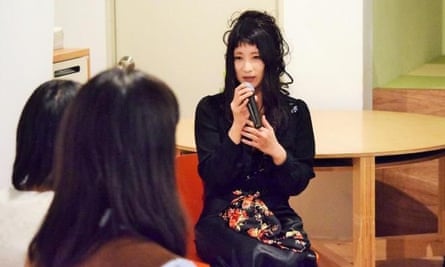When Kurumin Aroma was approached on Tokyo street four years ago and asked if she was interested in “glamour modelling”, she spied an opportunity to realise her dream of becoming a TV celebrity.
“The talent scout had a proper business card and spoke very respectfully, so I thought he was someone I could trust,” Aroma, who uses an assumed name in public, told the Guardian.
But months later, the 26-year-old became one of an alarming number of Japanese women who say they have been forced into appearing in pornographic films by unscrupulous, and unregulated, production companies.
Then in her final year at university, Aroma agreed to attend a follow-up interview, where the president of an entertainment production company presented her with a contract that indicated she would be required to remove her clothes for a photo shoot.
“That was the first I’d heard about nudity,” she said. “I cried, but felt under a lot pressure to say yes, so I agreed.”

Over the following months, the agency raised the possibility of making a pornographic video, summoning her several times to the firm’s office for meetings. Faced with repeated demands from as many as eight male staff, she eventually capitulated.
“They told me I could stop at any time if I felt uncomfortable or if it hurt. But that wasn’t true,” she said.
A slew of reports about women being offered modelling contracts, only to be tricked or coerced into appearing in X-rated films, has finally prompted authorities in Japan to confront the darker side of its multibillion dollar porn industry.
Last year, the government launched its first survey of the industry’s recruitment of vulnerable young women and found that 200 among the 20,000 surveyed had signed “modelling” contracts, with more than 50 later asked to pose nude or have sex on camera.
In 2016, 100 women sought help from Lighthouse, which supports victims of human trafficking, and People Against Pornography and Sexual Violence – a dramatic rise from the 62 cases recorded for the whole of 2015 and just 36 the year before.
In one high-profile case that resulted in the arrests of three talent scouts, one woman was forced to appear in more than 100 films after being told her family would be informed if she refused. Some victims say they were forced to have sex without protection, or were gang-raped.
In response, the Intellectual Property Promotion Association, which represents Japan’s adult film industry, promised to “encourage producers to take action to quickly improve the situation and restore the soundness of the entire industry”.
It added: “The association deeply regrets that we had failed to take initiative (to deal with problem before). We are very sorry.”
Kazuko Ito, a lawyer and general secretary of Human Rights Now, welcomed a recent police crackdown on street touts working for the porn and commercial sex industry, but said the industry had to be forced to change its ways.
“The incredible thing is that production firms can act with impunity,” Ito said. “There is no law against coercing women into appearing in porn films, and no government supervision of the industry. But this isn’t just a legal issue, it’s a violation of human rights.”
The Japanese porn industry is worth an estimated 500 billion yen (US$4.4 bn) in annual sales, with as many as 20,000 titles released every year. About a quarter of all films are aimed at older viewers - a reflection of Japan’s rapidly ageing society.
Typically, women in their late teens and early 20s, are approached on the street, told they have the looks and charisma to succeed in the mainstream entertainment industry, and are rushed into signing contracts that make oblique references to erotic material, or none at all.
When the women object, producers threaten them with fines, sometimes running into millions of yen, or say they will tell their parents, friends or former colleagues abut their new “career”.
In some instances, women who attempt to flee the set of a film are caught, confined to hotel rooms or taken to remote locations where escape is impossible. “There is rarely any actual violence,” Ito said. “But there are lots of other forms of pressure.
Now a YouTube personality with more than 15,000 subscribers, Aroma says she has never discussed her porn appearances with her parents and has been shunned by “furious” relatives.
“For the whole time I was involved in the porn film industry, my male handlers told me I belonged to them,” she said. “I had no freedom and nowhere to turn for help. I was trapped.”
Aroma succeeded in blocking DVDs sales of her two films, but several clips found their way online. It was only when she sought Ito’s help and met other victims that she felt able to speak out about her ordeal.
“I was scared about going public, but by then I knew I wasn’t alone,” she said. “I was finally in control, and that was a great source of strength. At the time I felt responsible for what happened to me, so speaking out has helped me to realise that I am not the guilty one.”
